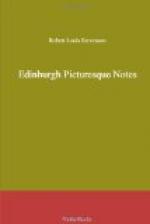And while you are looking, across upon the Castle Hill, the drums and bugles begin to recall the scattered garrison; the air thrills with the sound; the bugles sing aloud; and the last rising flourish mounts and melts into the darkness like a star: a martial swan-song, fitly rounding in the labours of the day.
CHAPTER IX. WINTER AND NEW YEAR.
The Scotch dialect is singularly rich in terms of reproach against the winter wind. Snell, BLAE, NIRLY, and SCOWTHERING, are four of these significant vocables; they are all words that carry a shiver with them; and for my part, as I see them aligned before me on the page, I am persuaded that a big wind comes tearing over the Firth from Burntisland and the northern hills; I think I can hear it howl in the chimney, and as I set my face northwards, feel its smarting kisses on my cheek. Even in the names of places there is often a desolate, inhospitable sound; and I remember two from the near neighbourhood of Edinburgh, Cauldhame and Blaw-weary, that would promise but starving comfort to their inhabitants. The inclemency of heaven, which has thus endowed the language of Scotland with words, has also largely modified the spirit of its poetry. Both poverty and a northern climate teach men the love of the hearth and the sentiment of the family; and the latter, in its own right, inclines a poet to the praise of strong waters. In Scotland, all our singers have a stave or two for blazing fires and stout potations:- to get indoors out of the wind and to swallow something hot to the stomach, are benefits so easily appreciated where they dwelt!




